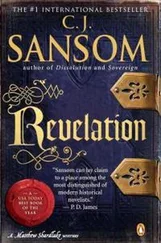‘Did you ever meet Master Hobbey?’
‘No. I know only what Michael told me. He said originally Master Curteys had been thinking of buying the nunnery and all the land that went with it, as an investment, but decided he could not afford it. He knew Master Hobbey through the Mercer’s Hall. Master Hobbey came to dinner several times to discuss splitting the woodland between the two of them, which was what happened in the end, with Master Hobbey buying the smaller share of the woodland and the nunnery buildings, which he was going to convert to a country residence. Master Curteys took the larger part of the woodland. Master Hobbey became friendly with Master and Mistress Curteys over the sale. He struck Michael as one who adopts reformist positions when he is with godly people, but if he were negotiating the purchase of lands with a papist he would take some beads to click. As for his wife, Mistress Abigail, Michael said he thought she was mad.’
Madness again. ‘In what way?’
She shook her head. ‘I don’t know. Michael did not like to talk to me of such things.’ She paused, then went on. ‘Master and Mistress Curteys died too quick to make wills. That was why everything was uncertain. But shortly afterwards Master Hobbey appeared with a lawyer, and told him the children’s future was being arranged.’
‘Do you know the lawyer’s name?’
‘Dyrick. Vincent Dyrick.’
‘Do you know him?’ the Queen asked.
‘Slightly. He is an Inner Temple barrister. He has represented landlords against me in the Court of Requests occasionally over the years. He is good in argument but – over-aggressive perhaps. I did not know he worked in the Court of Wards too.’
‘Michael feared him. Michael and the Curteyses’ vicar were trying to trace relatives, but then Master Hobbey said he had bought the children’s wardship. The Curteyses’ house was to be sold and Hugh and Emma were to move to the Hobbeys’ house in Shoe Lane.’
‘That went through very quickly,’ I said.
‘Money must have passed,’ the Queen said quietly.
‘How much land is there?’
‘I think about twenty square miles in all. The children’s share was about two-thirds.’
That was a great deal of land. ‘Do you know how much Hobbey paid for the wardship?’
‘I think it was eighty pounds.’
That sounded cheap. I thought, if Master Hobbey bought Hugh and Emma’s wardship he has control of their share of that woodland. In Hampshire, near to Portsmouth, where there would be much demand for wood for ships, and not too far from the Sussex Weald, where the expanding ironworks had brought constant demand for fuel.
Bess continued. ‘Master Hobbey seemed minded to get his own tutor, but Hugh and Emma had grown attached to Michael. The children asked Master Hobbey to keep Michael on, and he agreed.’ Bess lifted her hands, made a sort of helpless motion. ‘Apart from me, the Curteys family were all Michael had. He was a lad full of generous emotion: he should have sought a wife but for some reason never did.’ She composed herself again, continued in a flat voice. ‘And so the children were moved, and the house they had lived in all their lives sold and gone. I think the proceeds were put in care of the Court of Wards.’
‘Yes. It would be the trustee. So, Mistress Calfhill, your son moved with the children to Shoe Lane.’
‘Yes. He did not like the Hobbeys’ house. It was a small, dark place. And Michael had a new pupil. The Hobbeys’ son David.’ She took a deep breath. ‘Michael said he was a spoiled and pampered only child, the same age as Emma. Stupid and cruel, always taunting Hugh and Emma, saying they were in his house on sufferance, that his parents did not love them as they did him. True enough, I suppose. I believe Master Hobbey only took the children on to profit from their lands.’
‘Is it not illegal to make profit from a ward’s lands?’ the Queen asked.
‘Yes. Whoever purchases a wardship has custody of the ward’s lands, but he is supposed to take care of them and not make profit for himself. Though that is not always what happens. And he would have control of the girl’s marriage,’ I added thoughtfully.
Bess said, ‘Michael feared they wanted to marry Emma to David, so her share of the children’s lands would pass to the Hobbey family. Those poor children. Hugh and Emma cleaved together, they only had each other, though they had a friend in my son. Michael told me Hugh had a fight once with David, over something improper he said to Emma. She would have been only thirteen. David was a big strong boy, but Hugh beat him.’ She looked at me sharply again. ‘I told Michael he was getting too concerned over Hugh and Emma, he couldn’t be mother and father to them. But then –’ her face went blank once more ‘– then smallpox came to the Hobbeys’ house.’
The Queen leaned forward and laid a hand on Bess’s arm.
‘All three children caught it,’ Bess continued stonily. ‘Michael was forbidden their chambers for fear of infection. The servants were set to look after Hugh and Emma, but David’s mother cared for him herself, weeping and crying to God for her boy to be saved. I give her credit for that; I would have done the same for Michael.’ She paused, then said in a savage voice, ‘David survived unmarked. Hugh lived, but with a pitted face that destroyed his handsomeness. And little Emma died.’
‘I am sorry.’
‘Then a few days later Master Hobbey told my son his wife would not live in London any more. They were going to their house in Hampshire for good and he would not be needed. Michael never saw Hugh again – he and David were still being kept isolated. They allowed Michael to go to poor Emma’s funeral, that was all. He saw her little white coffin laid in the earth. He left that day. He said the servants were burning Emma’s clothes in the garden in case they harboured the ill humours of the disease.’
‘A terrible story,’ I said gently. ‘Death and greed, and children the victims. But Mistress Calfhill, your son could have done no more.’
‘I know,’ she said. ‘Master Hobbey gave Michael a letter of recommendation, and he got other positions in London. He wrote to Hugh, but had only a stiff reply from Master Hobbey saying he should not write, they were trying to build a new life for the boy in Hampshire.’ Her voice rose. ‘The cruelty of it, after all Michael had done for those children.’
‘That was hard indeed,’ I said. Yet I could see Hobbey’s point of view. In London the boy Hugh had lost his entire family.
Bess continued, the tonelessness returning to her voice. ‘The years passed. Then at the end of last year Michael took a place down in Dorset, teaching the sons of a large landowner. But the fate of Hugh and Emma seemed to haunt him. He often said he wondered what had become of Hugh.’ She frowned and looked down.
The Queen spoke again. ‘Come, Bess, you must tell the last part, though I know it is the hardest.’
Bess looked at me, steeled herself. ‘Michael returned from Dorset to visit me at Easter. When he arrived he looked terrible, pale and distracted, almost out of his wits. He would not tell me why, but after a few days he suddenly asked if I knew any lawyers. For what, I asked. To my amazement he said he wished to apply to the Court of Wards for Hugh to be taken from the Hobbeys’ custody.’ She took a deep breath. ‘I told him I knew no lawyers, and asked why he should do this now, after six years. He said it was something not fit for my ears or any woman’s, or man’s either except a judge. I tell you, sir, I began to fear for Michael’s reason. I can see him now, sitting opposite me in the little house I have, thanks to the Queen’s goodness. In the light from the fire his face looked lined – old. Yes, old, though he was not yet thirty. I suggested if he wanted a lawyer perhaps he should visit Master Dyrick. But he laughed bitterly and said he was the last person he should go to.’
Читать дальше
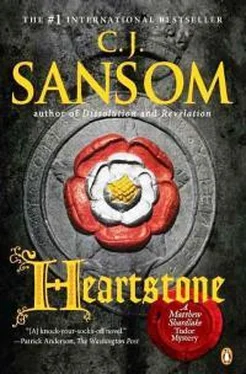
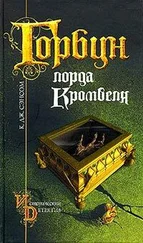
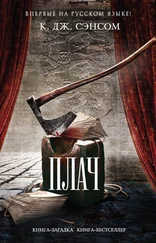

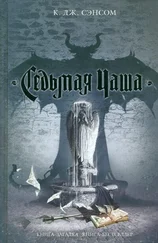
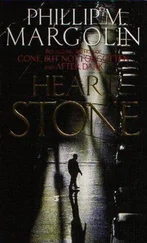
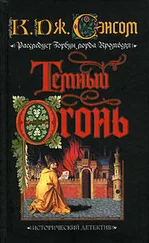
![К Сэнсом - Стенание [другой перевод]](/books/432043/k-sensom-stenanie-drugoj-perevod-thumb.webp)
